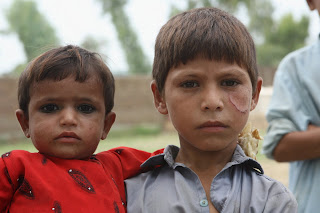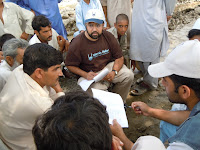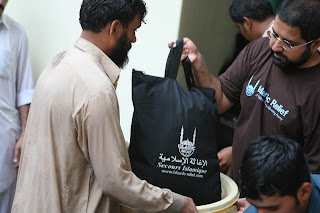You could see the desperation in their eyes. Still, they waited patiently as scores of volunteers rushed around, readying hot plates, carefully arranging distribution stations, and laying out heaps of clothing in hopes of helping the less fortunate in their neighborhood.
With Ramadan in full swing, many of the volunteers were observing the daylong Ramadan fast and the scorching heat was audibly parching their throats. Their voices cracked when they spoke and many of them had dried saliva on their lips.
"I can't think of anything better to be doing on a fasting day," Nahida Ahmed told me. Ahmed, 28, was helping pass out food trays despite being hungry herself.
It was Islamic Relief USA's Day of Dignity – an event characterized by love, compassion and sacrifice. And volunteers flooded into the mosque at 8 a.m. to be apart of the event as if they were the ones benefiting.
For people in need, the warm meals, fresh fruit, socks, shirts, caps, hygiene kits, and all the other items available for distribution at the Day of Dignity are a beacon of hope. One less worry for mind plagued with the most difficult of stress: "Will I survive another day?"
"Every day is a challenge," 45-year-old Glenn Black told me as he munched on some rice and beef provided at the event. He balanced an Islamic Relief tote bag full of clothes between his knees. "I need these clothes because it's getting close to wintertime," he said. His skin was thick and calloused, probably from sleeping in the street.
Another beneficiary told me just how much events like the Day of Dignity impact his community. "It helps out the neighborhood a lot," Alfred Burney told me. “Especially the kids.”
The 54-year-old was impressed that Muslims were spearheading the cause. “I’m surprised that it’s Islamic Relief,” he said.
Dennye Mills, a 55-year-old toothless and homeless widow, was there for the fresh fruit because it was easier to eat than the food she was used to receiving at food banks. "God bless Islamic Relief," she said between bites.
"The need here is huge," said Islamic Relief USA’s Domestic Programs Coordinator, Karim Amin. Amin is a strong supporter of helping fellow Americans in need. "Islamic Relief USA organizes the Day of Dignity because you must help your neighbors first before you help people afar," he added.
After the event was over and the bustle died down, I made my way across the street and noticed that one of the beneficiaries had picked an abandoned building's front step to lay his head. With his arms sprawled beside him and his newly acquired shoes cordoning off his territory, I realized what was going on.
To learn more or to donate to Day of Dignity, click here.
-- Zeyad Maasarani














